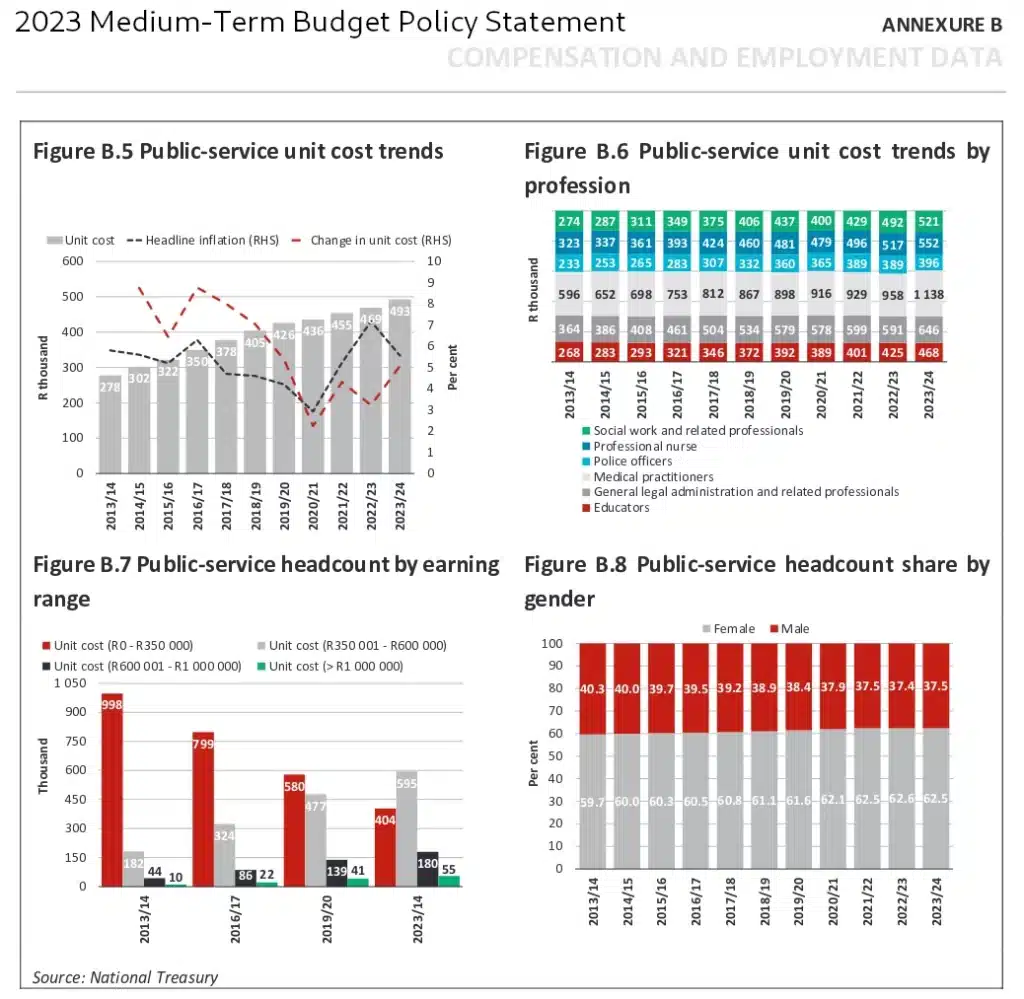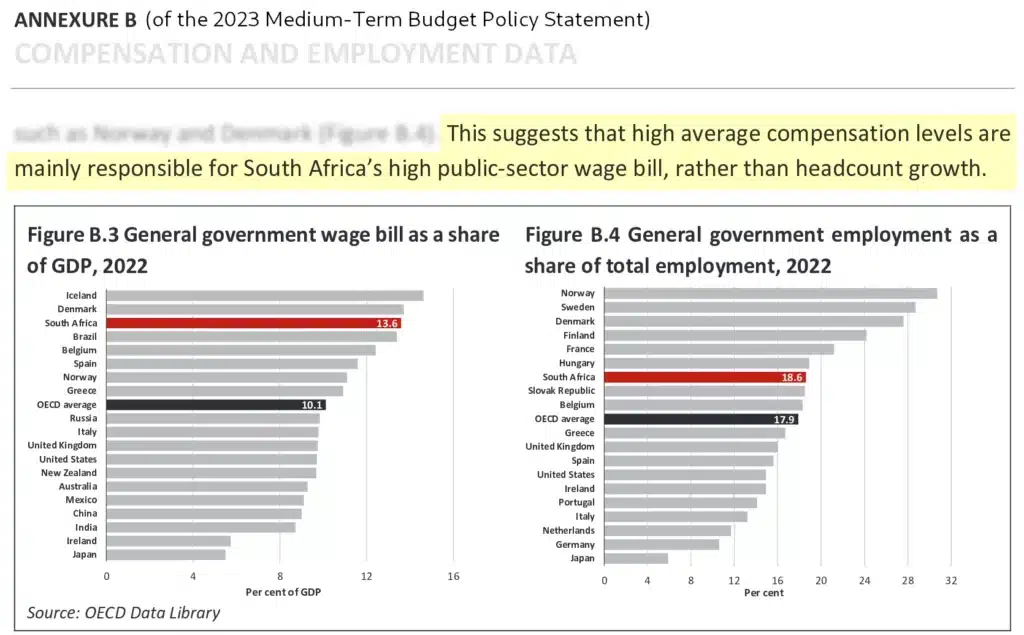Talk of tax morality is cheap when public servants are overpaid and underperforming, as the Medium-Term Budget Policy Statement makes clear.
Finance minister Enoch Godongwana’s Medium-Term Budget Policy Statement (MTBPS) comes with an Annexure B, which takes a closer look at the government wage bill and benchmarks it against international peers.
It will shock only Cyril Ramaphosa to learn that the unit cost of civil servants rose by 77% in the last decade, which is well above the cumulative inflation of 65% over the same period.
According to Annexure B, Treasury data indicates that an astonishing 55 000 civil servants, or 4.5% of the entire workforce, now earn over R1 million per year, compared to 10 000 a decade ago.

Even more startlingly, whereas 81% of civil servants earned less than R350 000 per year a decade ago, only 33% remain in this pay bracket. Almost half of civil servants now earn between R350 000 and R600 000, and 19% earn even more.
South Africa’s public wage bill amounted to 13.6% of GDP in 2022, placing it third among the countries of the Organisation for Economic Cooperation and Development (OECD), and far above the OECD average of 10.1%.
However, the size of the civil service as a share of total employment is 18.6% in South Africa, compared to the OECD average of 17.9%.

So, for a civil service that is only 4% larger than the OECD average, South Africa pays 35% more.
This has made South Africa’s civil servants among the best-paid, if not the best paid,in the world.
55 000 millionaires
And what do we have to show for it? One would expect a world-class civil service, that excels at service delivery at all levels.
For a taste of what these 55 000 millionaires and their fat-cat cohorts offer to the hard-working taxpayers of South Africa, let’s quote the Auditor-General, from the Consolidated General Report on Local Government Audit Outcomes for 2021/22:
‘Audit outcomes showed little improvement overall and the number of clean audits decreased. … Municipalities should be using information technology systems to help them deliver efficient and effective services and to maintain accurate financial records. However, this is not what is happening, mainly because they are unable to design, implement and maintain key systems and controls. … The financial health of municipalities continued to deteriorate… Municipalities continue to neglect municipal infrastructure because of their reactive approach to planning and maintenance. … We continued to see municipalities that do not adequately plan for delivering key basic services and do not report credibly on that delivery, with many also not achieving their planned targets. In addition, accountability is hampered as there is little transparency on the true state of local government’s delivery of key basic services such as water, sanitation, electricity and housing.’
Only 15% of municipal administrations received clean audits, down from 16% the year prior. Half of those are in the Western Cape.
The causes for all this, the A-G says, are inadequate skills and capacity, governance failures and a lack of accountability and consequences.
Similar problems exist at the national civil service departments, such as the Defence Force, the Department of Basic Education, and the Department of Health.
Pen and paper
So we have public servants stuck in the 20th century, working with pen and paper when they work at all, unable to meet basic performance standards, and for that, they’re earning the big bucks.
The Public Service Commission, which is essentially a glorified complaints department that evaluates its own performance based on the number of ‘grievances’ it resolved, spent two days last week at the larney Birchwood Hotel near O.R. Tambo International Airport, eating canapés and drinking wine at the taxpayer’s expense, holding a National Dialogue on Anti-Corruption.
A dialogue? With whom? What’s to discuss?
Fire corrupt civil servants. Lay criminal charges. Prosecute them. Jail them.
Why does any of this need a two-day ‘dialogue’ organised by the National Anti-Corruption Advisory Council and the Presidency?
Meanwhile, out on the streets, the sewage runs and the taps are dry and the lights are out, with service delivery protests a near-daily occurrence around the country.
This is what we pay the fat-cat civil servants so much of our hard-earned money for.
And then they dare talk to the people about ‘tax morality’ and the urgent need to raise more revenue to fund all of this financial mismanagement and unproductive hobnobbing.
Cruel truth
The cruel truth is that this is not a solvable problem. The government has been promising to get civil service wages under control for years. Godongwana himself promised to ‘rationalise’ the public service.
But they know this won’t happen. There’s an election next year. Retrenching even a few of the two million or so civil servants will guarantee the ANC a sound defeat.
The unions have the power to hold the entire country to ransom in their quest to prevent ‘rationalising’ the civil service and pursue above-inflation wage increases. Strikes have a nasty tendency to turn violent and could topple the country into total anarchy.
One would think the government would try to fight the unions, but it is hopelessly compromised because the ruling party and the unions, instead of being enemies, are in an electoral alliance.
The ANC needs the votes of its union alliance partners, and therefore cannot and will not go to war with them.
So, South Africa will remain saddled with a bloated, ineffective, inefficient, corrupt, incompetent and failing civil service for the foreseeable future. But at least we can brag that our civil servants eat like kings.
[Image: Service delivery protest in Standerton, Mpumalanga, where residents voiced their unhappiness about the poor quality of the water in town. Image by Jan Truter for the University of Cape Town. Used under a Creative Commons licence.]
The views of the writer are not necessarily the views of the Daily Friend or the IRR
If you like what you have just read, support the Daily Friend

